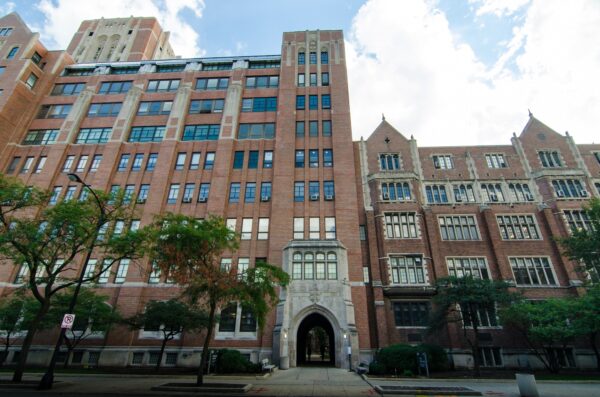Phase 1 Attendance and Late Arrival Policy
Introduction
Approved by CCIA on 7/31/2019, 8/4/2021, 8/2/2022, 8/2/2023, 7/3/2024
Elements of Professional Engagement in Phase 1 Curriculum
Physicians in practice are expected to engage fully in their professional responsibilities to maintain the trust of the public they serve. Attendance, punctuality and feedback are particularly important reflections of this professional engagement. The MD Program at the University of Illinois College of Medicine maintains firm policies for several reasons:
- Punctuality during medical school instills the habits that learners will need as clinicians in practice.
- Anticipating and communicating the need to be absent from “attendance mandatory” curricular sessions is a demonstration of learners’ good judgment; framing this need in the form of a request (e.g., asking permission) is a demonstration of learners’ respect for one’s colleagues and recognition of how absences impact the workplace.
- The majority of in-person learner curricular time is in active learning formats. Learner participation and preparation is an essential element for both individual learning and learning of peers as collaborative teams.
- In many learning sessions, specific resources (e.g., cadavers) or services (e.g., standardized patients) have been provided and scheduled for learners based on the anticipated number of learners in the class.
- Providing comprehensive feedback on the curricular sessions allows for iterative quality improvement
The faculty consider learners’ presence at attendance mandatory learning sessions to be a fundamental part of the academic expectations of the MD program. Each course will delineate how the elements of professional engagement are incorporated into the assessment in the course syllabi.
As in professional practice, a pattern of tardiness or absences, whether excused or unexcused, is not acceptable. If a pattern is observed, a meeting with curricular administration may occur.
For the class of 2028 (entering Fall of 2024) and beyond:
Exemplary professional engagement in Phase 1 will be noted in the learners’ Medical Student Performance Evaluation (MSPE).
- If a learner attends all attendance-mandatory sessions with no unexcused absences and no more than 3 days of excused absences) throughout Blocks 1-7, it will be noted on their MSPE
- If a learner completes 75% or more of the available course evaluations that are not part of a course grade throughout Blocks 1-7 & DoCS, it will be noted in their MSPE
College-wide Policy and Procedures
Punctuality
The Illinois Medicine Curriculum Phase 1 Attendance Policy is consistent for all campuses and is approved by the College Committee on Instruction and Appraisal. Students are expected to be in their seat prepared to engage in the session at the scheduled start time of the session. The process for documenting attendance requires each student to verify attendance for the session by completing a “sign in” within the first 5 minutes of class. Each campus procedure in applying the Phase 1 Attendance Policy is approved by the cross college curricular deans.
Attendance at Learning Sessions
Students are recommended to attend all learning sessions offered in the Phase 1 courses. Learning sessions are labeled either “attendance-mandatory” or “attendance-recommended.” Students are responsible for all material covered in sessions on the curricular calendar within a course, regardless of the session designation or the learner’s attendance.
All learning sessions designated “attendance-mandatory” will be listed in the course syllabi.
Excused Absences
Each campus has a procedure by which students must request excused absences. Students should work with their local campus administrator to ensure they are following the correct procedure for requesting an excused absence. Each process has the following in common:
- All attendance-related communication from and to individual students must be in writing.
- Communication about absences for attendance-mandatory sessions is expected, regardless of whether the absence is excused or unexcused.
- The curriculum administration on a specific campus, applying College-wide procedures, determines if students’ absences are excused or unexcused, in accordance with the attendance policy.
- Communication of those decisions to students indicates that the decision was made by curriculum administration on a specific campus, applying College-wide procedures.
- Requests for excused absences may prompt further discussion with curriculum administration to provide support and determine whether the absence qualifies as excused.
Examples of absence requests that are often approved by the curriculum administration include:
- Illness of student (mental and physical illness), significant other or family member*
- Funeral of a significant other or family member
- Healthcare provider appointment for student
- Religious holidaysǂ (See UIC Senate Policy on Religious Holidays)
- Own wedding (maximum 3 days)
- Jury duty
- Court date
- Inability to obtain emergency childcare (maximum 3 days across the term)
ǂReligious holidays are always approved but must be communicated by the local campus process.
*Documentation is required if the illness exceeds three days. Additionally, documentation may be requested in cases where multiple absence requests are submitted across a term.
Examples of absence requests that may be approved by the curriculum administration include:
- Illness of extended family member or friend
- Student participation on a College of Medicine Committee
- Funeral of a friend
- Major life event of a significant person in the student’s life (e.g. another’s wedding, graduation, match day etc) (maximum of three days based on location and date of event)
- Presenting or playing a key role at a medical conference or other professional organization meeting
- Pet medical emergencies
- Other circumstances of an extreme, unanticipated, and compelling nature
If an absence is anticipated, permission must be requested prior to the date of the learning session in order to be counted as an excused absence. When permission can not be requested prior to the session (extenuating circumstances), the request must be submitted by noon the following day. If documentation is required, it must be submitted within 7 calendar days of the session. If this is not done the absence will be considered unexcused.
Unexcused Absences
Examples of absence requests that are considered unexcused by the curriculum administration include:
- Employment conflict
- Missed ride
- Missed flight/bus/train
- Overslept/forgot to set alarm
- Out of town without prior excusal
- Listed wrong date on personal calendar
- Travel booked before schedule is finalized
- Administrative appointments (Passport, DMV, etc)
Phase 1 Courses: Late Arrival
Students are expected to go to the session even if they will be arriving past the posted start time. Students should contact the course coordinator immediately following the session to explain the reason for the late arrival.
Late arrivals will follow the same protocol for excused or unexcused absence in the paragraphs above. An arrival is considered late 5 minutes past the posted start time for the session.
An unexcused late arrival will result in an unexcused absence.
Late Arrival to a Team Based Learning (TBL) Session
Students with an excused absence (refer to definition listed above), must make up the Individual Readiness Assessment Test (IRAT) to receive their Team Readiness Assessment Test (TRAT) score. They will be rescheduled to make-up the IRAT of the TBL within 7 calendar days. Documentation may be required within 7 calendar days of the exam date to qualify as an excused absence. Students who arrive after the start of the IRAT will be allowed to log in to the exam and complete the IRAT during the remaining available time. Students who arrive late to the IRAT without an excuse will not be given additional time to complete the IRAT, unless they were excused to arrive late to class. Students will be given the score they receive on the IRAT. Students who arrive late to the IRAT but were excused will receive the college-wide average IRAT score. Students who arrive late to the IRAT but are present at the start of the TRAT will be allowed to participate in the TRAT and receive their team’s score. Students who do not arrive by the start of the TRAT will not receive credit on either the IRAT or the TRAT portion of the TBL and must be directed to the campus administrator. Students with an excused absence must make-up the IRAT to receive their TRAT score.
Phase 1 Courses: Implications of Failure to Sign in
“Failure to sign in” is an instance in which students are in attendance for an in-person session but fail to log their attendance within the first 5 minutes of the session by the usual sign in procedure. The student will need to contact the course coordinator to request use of the “failure to sign in” by noon the following day. If this is not completed, it will count as an unexcused absence.
Each course has designated the maximum failure to sign-in occurrences allowed before additional absences are subsequently counted as unexcused. Students should refer to each course syllabus for that information.
Phase 1 Courses: Implication of Unexcused Absences
Professional engagement points are part of the grade construct for each Phase 1 Course. The components of professional engagement will be outlined in each course syllabus.
Phase 1 Courses: Leaving Early
Leaving an “attendance mandatory” session prior to its completion without prior approval is considered a professionalism concern, and the student may be required to meet with the campus-designated curricular administration team.
If a student must leave a mandatory session due to an emergent issue, the student should contact the course coordinator as soon as feasible. The campus-designated curricular administration will deem the absence to be excused or unexcused.
Late Arrival to a Block Exam
Students are expected to arrive before the scheduled start time of an exam. Late arrival to exams is disruptive to faculty, staff, and classmates.
Students who arrive late but within 20 minutes of the scheduled start of an assessment (i.e. exam) are still eligible to sit for the exam.
Students who arrive more than 20 minutes late will be directed to the appropriate exam administrator. Students with an excused absence (refer to the definition listed above), will be rescheduled to take the exam at a later date and/or time determined by the administration. Documentation may be required within seven calendar days of the exam date to qualify as an excused absence. Students without an excused absence will receive a score of zero for the exam.
Late Arrival to an OSCE
OSCE exams require precise timing in order to ensure that each student has the required time to successfully complete their exam. Any student who arrives at a Standardized Patient activity after the encounter time for their group has started will be turned away. This will be counted as an unexcused absence. The student will receive a score of zero. Students should review the DoCS syllabus for information regarding “High-stakes examinations”.


